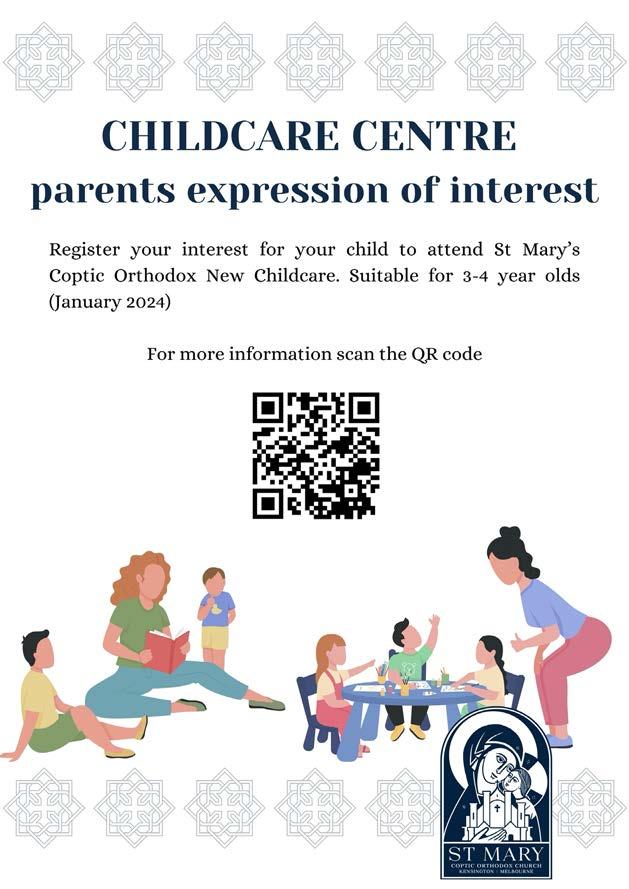
15 minute read
The Departure of St. John, of the Golden Gospel.
23rd July - 16th Abib
On this day, St. John, the owner of the Golden Gospel, departed. This saint was born in the city of Rome. His father was a rich man whose name was Atrofius )Trabius(. His father gave him a copy of the Gospel of St. John written in letters of gold and bound with a golden cover and from this he was generally known as “John of the Golden Gospel.” John rejoiced exceedingly with this gift.
A monk, who was on his way to Jerusalem, came to visit his father’s house. John asked the monk to take him with him. The monk told him that he was going to Jerusalem and not to the monastery. He also told him that he was young and could not endure the rough life that the monks practiced. Nevertheless, John was sincere in his intention, so he embarked on a ship, without telling anyone, to the monastery of that monk. When the Abbot saw him, he refused to accept him because of his young age, and explained to him that the monastic life was difficult for one like him. John pleaded with him, and when the Abbot saw his firm intention and strong conviction, he accepted him. He shaved his head, and arrayed him in the holy garb of the monastic life. John devoted himself to the ascetic life with many worships. The Abbot often advised him saying, “Have pity on yourself, and do as the rest of the brethren.” But John used to answer, saying, “The power of God and your prayers support me.”
Seven years later, he saw in a vision, who told him, “Rise, and go to your parents, that you might receive their blessings before your departure from this world.” This vision was repeated on three consecutive nights, and he told the Abbot about it. The Abbot told him that this was from God, and advised him to go to see his parents.
When he left the monastery, he found a poor man wearing ragged garments, he took them from him, and gave him his own monk’s garb. When he arrived at his father’s house, he lived for three years, near the door of the house, in a small hut made of straw. He ate, during this time, the fragments from his father’s table which the servants threw to him. Whenever his mother passed by him, she was disgusted by his smell and the appearance of his clothes.
When his departure drew near, the Lord made it known to him that after three days he would depart from this world. St. John sent and called his mother. Without telling her that he was her son, he made her swear to bury him in that hut with whatever clothes he had on. Then, he gave her the golden Gospel and said to her, “Whenever you read in it, remember me.” When his father returned to the house, she showed him the Gospel, and immediately he recognized that it was the Gospel of his son John. They came in haste to St. John and asked him about the Gospel and about their son. He asked them to assure him that they would not bury him except in the clothes that he had on, and then he told them that he was their son. They wept with a great weeping. When the nobles of the city of Rome heard that, they gathered to see this righteous monk. After three days, he departed and his mother clothed him with the clothes that she had prepared for his wedding day before he went to the monastery. Thereupon she fell sick, and her husband remembered the oath that they had given. Immediately he removed the clothes of his son and clothed him with the old ragged cloth that he had on and buried him in the hut in which he had lived. Many miracles were manifested from his body. Then they built a church in his name and placed his body in it.
May his prayers with us. Amen.
The Martyrdom of St. James the Apostle, Bishop of Jerusalem. 25th July 18th Abib
On this day, St. James the Apostle, Bishop of Jerusalem, who was the son of Alphaeus, was martyred. (Mat. 10:3) The Holy Bible mentioned his brothers, Joses, Simon, and Judas, the sons of Cleophas. (Mat. 13:55) The Greek word “Cleophas” means in the Syriac language “Alphaeus”. His mother, the sister of the Virgin, was also called Mary and was the wife of Cleophas. (John 19:25)
When he grew up he was known as James the Just. For there was a drought in Palestine and he prayed to God, Who sent the rain and watered the land, as Josephus, the Jewish historian, testified. He was called James the Less, to identify him from St. James the son of Zebedee, and the brother of St. John the beloved. It was said that the Lord had appointed him bishop of Jerusalem when he appeared to him. “After that He was seen by James, then by all the apostles.” (I Cor. 15:7) He was called the head of the church in Jerusalem for it was the mother church and from it the Good News had spread to the other churches. He wrote a liturgy, with which the Armenians still pray.
During his time and in the year 53 A.D. a Council of the Apostles and priests convened in Jerusalem and St. James presided over it. During this Council St. James said, “Therefore I judge that we should not trouble those from among the Gentiles who are turning to God, “but that we write to them to abstain from things polluted by idols, from sexual immorality, from things strangled, and from blood ... “ (Acts 15:19-21) St. James preached and taught the Name of the Lord Christ, brought many back to the faith, and baptized them. God wrought by his hands many signs and wonders. One day, many of the Jews came to him and asked him to tell them about the Lord Christ. They thought that he would tell them that Jesus was his brother. St. James went up to the pulpit, and began to explain to them the Godhead of the Lord Christ, His eternal existence, and His equality with God the Father. When they heard this they were wrath with him, they dragged him down, and beat him severely. One of them beat the apostle on the head with an iron rod, and he delivered up his soul instantly.
It was said about this Saint, that he never drank wine, and never wore clothes, but always wore a linen loin-cloth, and that he kneeled so often during his worship and praying that his feet and knees became swollen, and the skin of his knees became like that of the camels.
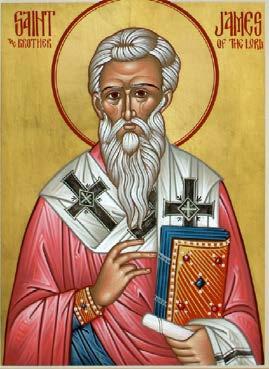
May his prayers be with us and Glory be to God forever. Amen.
The Martyrdom of St. Theodore of Shotep. 27th July – 20th Abib
On this day, of the year 220 A.D., St. Theodore of Shotep was martyred. His father’s name was John and he was from the city of Shotep in Upper Egypt. He went with his regiment to the city of Antioch, where he married the daughter of a pagan noble man, and begot by her this St. Theodore. When his mother wanted to present him to the house of idols to be educated there, his father refused. She became angry, drove him away, and the child remained with his mother. His father John prayed ceaselessly, and entreated God to guide his son Theodore to the path of salvation. The child grew up, and learned philosophy, wisdom, and literature. The Lord Christ illuminated his heart, and Theodore went to a righteous bishop who baptized him. When his mother heard of this she was sorrowed greatly, but the Saint did not mind her.
He joined the army and advanced in the ranks until he became one of the great generals during the reign of Emperor Lucianus. The people of the city of Eukhitos worshipped a great serpent, and offered to him a human sacrifice every year. While St. Theodore was passing through this district, he saw a woman crying bitterly. He asked her about the reason for her crying. She answered him saying, “I am a widow and they have taken my two sons to offer them as a sacrifice to the serpent, although I am Christian.” He said to himself, “They have wronged this woman, but God shall avenge her.” He came down from his horse, and turned his face towards the East and prayed, then drew near the serpent. The people of the city were watching him from the tops of the walls of the city. The serpent was fourteen cubits long, but God gave him power over it, and he speared it with his spear and killed it, and delivered the sons of the widow.
After this, Theodore came to Egypt to search for his father, and he stayed with him until he died, and then returned to Antioch. He found that the Emperor had apostatized the faith and started to persecute the Christians. He came before him and confessed the Lord Christ. The Emperor ordered him beaten with rods, burned, and cast into the fire. He delivered up his soul and received the crown of martyrdom. A Christian woman took his body - it was said that she was his mother - after she gave much money to the soldiers and hid his body until the end of the time of persecution. Churches were built in his name in many cities.
May his prayers be with us and Glory be to God forever. Amen.
The Martyrdom of St. Pantaleemon, the Physician. 26th July – 19th Abib
This day also marks the martyrdom of the honorable St. Pantaleemon, the Physician. This saint was born in the city of Ta’madan. His father, whose name was Astochius (Asturius), was pagan, and his mother, whose name was Unala (Ulana), was Christian. They taught him the medical profession. A priest lived near their house, and every time Pantaleemon passed by him, and the priest saw his stature, his comeliness, his knowledge, and his wisdom, he was sorrowful for him for he was away from God. The priest entreated God in his prayers, to guide Pantaleemon to the way of salvation. Having repeated his petition to God for Pantaleemon’s sake, the Lord told him in a vision that he would believe through him. The priest rejoiced, and started to speak to him whenever he passed before him, until a friendship grew between them. The priest started to explain to him the corruptness of idol worshipping and the nobility of the Faith of the Lord Christ and the noble life of its followers. He also told him about those who believe in Christ, and the signs and wonders wrought by their hands. When Pantaleemon, the Physician, heard that, he rejoiced and desired to perform these signs to perfect his medical profession. One day, he was passing through the market-place of the city, and he saw a man, whom a serpent had bitten, lying on the ground and the serpent was standing up before him. He said to himself, “I will put to test the words of my teacher, the priest, who told me, ‘If you believe in the Lord Christ, you shall work miracles in His Name.’” He drew near that man, and prayed a long prayer, asking the Lord Christ to manifest His Power in healing that man, and in killing that serpent, so that it might not harm anyone else. When he finished his prayer, the man rose up alive, and the serpent fell down dead. Pantaleemon’s faith increased; he went to the priest, who baptized him, and he went on practicing medicine.
One day a blind man came to Pantaleemon that he might heal him, but his father sent him away. The Saint asked him, “ Who was asking for me?” His father replied, “It was a blind man, and you can not heal him.” The Saint told him, “You shall see the glory of God.” He called the blind man back, and asked him, “If you can see will you believe in the God Who shall heal your eyes?” The man said, “Yes, I will believe.” The Saint prayed over him a long and a profound prayer, and then he laid his hand upon the eyes of the blind man, and said, “In the Name of the Lord Christ receive your sight.” Straightway, he received his sight and believed in the Lord Christ. When his father saw that, he also believed. The saint brought them to the priest who baptized them.
When his father departed, the Saint set his slaves free and gave all his money to the poor. He treated the sick freely, and asked them to believe in Christ. The other physicians were jealous of him, and they laid accusation against him, the priest and many others who had believed, before the Emperor. He brought them and threatened to torture them if they did not deny the Lord Christ. When they did not yield to his threats, he tortured them severely then cut off their heads. The Emperor exaggerated in torturing St. Pantaleemon, he cast him to the lions which did not harm him, and the Lord strengthened and healed him. Finally, the Emperor ordered to cut off his head and he received the crown of martyrdom. May his prayers be with us. Amen.
Third Sunday of Abib (Luke 9: 10 – 17)
“So they all ate and were filled”
Luke 9: 17
+ When the day began to wear away: When the Apostles returned, they told Him all what they had done. The Lord sent them as lambs among wolves. They had no bag, no bread, no money, no worldly provisions. The Lord worked in their weakness and lack of provisions. He became their strength, their gold, their money and enabled them to conquer the world. They learned the first lesson. They should not get entangled with worldly worries. They needed to learn the second lesson, that is to overlook worldly measures and standards in their life. They were still using worldly measures, who is greater or bigger? The Lord’s standards are completely different. By world standards five loafs and two fish is just enough to feed a young boy. In God’s measure, it can feed five thousand and even the whole world. In the middle of the crowd The Lord says to them “you give them something to eat”. The answer according to the world measures is:
+ We have no more than five loaves and two fish
We are poor, we are weak, we have no knowledge, we are young. We have nothing.
+ We are poor
How hard to think in this manner? There are many who think that money can facilitate and buy everything. They even measure people with how much money they have. There at the Gate of the temple which is called Beautiful (Acts 3), Peter and John met a certain lame from his mother’s womb asking for alms. Silver and gold, they do not have. They were poor, but they have other things which no gold or silver can buy or obtain which was: “In the name of Jesus Christ of Nazareth rise up and walk” (Acts 3: 6).
One-day St Rewis was seen by a soldier who felt sorry for him as he wore little worn out clothes. He thought he is a bigger. He gave him a silver coin as some alms. St Rewis looked lovingly to him saying “yeas we are poor! But you should know that poverty in Christ is a wealth surpasses all the treasures of the world. He asked him to open his handkerchief where he put a handful of dust in return for his alms. When the soldier went home he told the story to his wife and looked at the handkerchief, it was full of shining gold! Yes, we are poor “yet making many rich” (2Co 6: 10). This is the poverty full of peace in the Lord. In the book of Proverbs: “Better is a dry morsel with quietness, Than a house full of feasting with strife.” (Prov 17:1). How long you keep this world control you and keep you busy and do not care for your own salvation. Love of money is the root of all evil and can make you to lose your inner peace, even your life.
+ We are weak:
According to this world measures we are weak or have no status or worldly glory. We may look as distinguished or dishonoured and the filth of the world. Being reviled we bless, being defamed, we entreat (1Cor 4: 10-13). Christianity in the world sight looks to dedicated for the weak. Our weakness is mightier than the strong. Young David was much stronger than Goliath the mighty (1Sam 17). Elisha on his own was much stronger than all the armies of Aram. He could do what all the army of Samaria could not do (2Kings 6). Remember that love is not weakness. You are not a coward for you can bear with others. Forgiving those who hurt you does meat that you cannot defend your rights. This is truly the secret of your inner strength. The one who does not follow the commandments of love is throwing away the best weapon which can defeat the strongest of the strong.
+ We are without knowledge:
According to the world standards we look to be backward and not following the fashions of the world. In fact, through our ignorance we shall inherit the Kingdom of Heaven which they will lose in the vanity of their knowledge. St Paul who was taught by Gamaliel the teacher of Law who persecuted the church says “I was shown mercy because I acted in ignorance and unbelief )1 Timothy 1:13(. He did not benefit for all this knowledge. He considered as ignorance. In the ignorance of Christianity, he conquered the world. The Lord has chosen the simple to defeat the wisdom of the wise. You may look as a person who is not worldly fashionable. This is a praise for you. How great to be ignorant and naive about the worldly issues, lusts and desires. This lack of knowledge is a real blessing for you.
+ We are young:
“Let no one despise your youth” (1Timothy 4: 12). The world may consider us little or naïve, but in God’s sight we are not little but we are growing in grace and stature in front of God and all the people. All what you have may be only five loaves and two fish. It can hardly be enough to feed a young boy. This very little and be enough to feed thousands and even the whole world if you put in God’s hands. When you measure in Gods standards and ways, you will notice amazing difference in all your measures.
Any small number divided by big number will end up negligible. If you put this small number below the big one the result will be amazingly large. When you put God last you will measure nothing. That is what happen when God is not First in your life. But, when God is First, then your weakness will turn to strength and your ignorance will turn to wisdom.
The widow of Zarephath of Sidon (1Kings 17: 7 – 16( had only a handful of flour in a jar and a little olive oil in a jug just enough for her last meal with her son. When she put them in God’s hands the reward was: “For the jar of flour was not used up and the jug of oil did not run dry”. + So they all ate and were filled: Only five loaves and two fish were enough. The amount is not the measure but the work of God in your life. Let God enter your home. Let God have a share in your time and your life. The reason you are suffering is you are distant from God. You do not pray. You do nor repent and confess. You rarely have communion. You are always busy about this world matters and issues.
Bring to the Lord your five loves and two fish. Let the Lord bless the little you have. You will be amazed how much the Lord can do with little. It is fulfilling and sparing. Full twelve baskets of the leftovers.
“The blessing of the LORD makes one rich, And He adds no sorrow with it.” Proverbs 10:22
+ The Blessing of the little:
In the Hands of the Lord five loafs and two fish turned to a great banquet which was enough to feed five thousand families. So also a little of oil through the prayers of Elisha filled so many pots and was enough to pay for all the debts of the widow. The Lord worked wonders with only three hundred men with Gedeon to conquer the great armies of Median and to rescue His people. The Lord blessed Abraham, gave him Isaac in his old age born from Sara who was barren and made him a great nation that cannot be counted. David the King mad a great mistake by trying to count the people against God’s promise that He blessed them so much that they cannot be counted. The Lord punished his for his mistake. The Lord promised to bless His people if they listened to His Commandments and make then a blessing for all nations and also warned them from disobedience that they will be scattered and blessings will depart from their homes, fields and works. How much we need to live the Lord’s Blessings which starts with peace and real inner happiness. Blessing appears through acceptance and obedience. Through hard work and proper organization fruits get multiplied. You can enjoy real blessing if you submit to God’s plan and guidance through the Holy Spirit. Let the blessings fill your life. Little in the hand of the Lord is blessing. Plenty in the hand of the world can be curse.

Rest in peace with the hope of resurrection and eternal life for his gracious virtues the late Gabriel Hazim. His mother: Leila El Hadj Hazim widow of the late Michel Hazim, his brothers: Andre Hazim, his wife Elaine and their children, George Hazim and his children, Sisters: Micheline, the wife of Romaney Marcos and their children, Elaine the wife of Salim Atik and their children
Thursday 20 July 2023.

Funeral Service 1:00 pm at St Mark›s Coptic Orthodox Church - Melbourne
40-42 Gilbert Rd, Preston VIC 3072
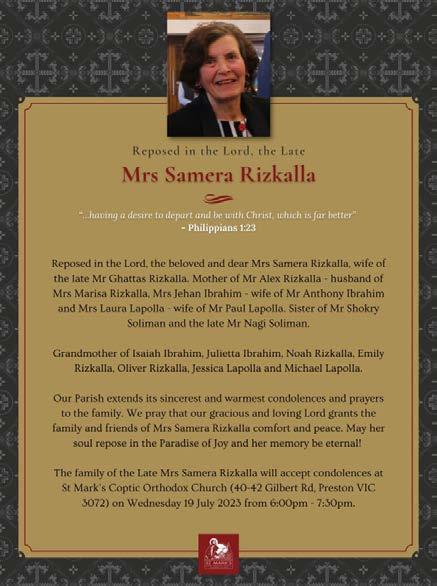
Blessed Engagement
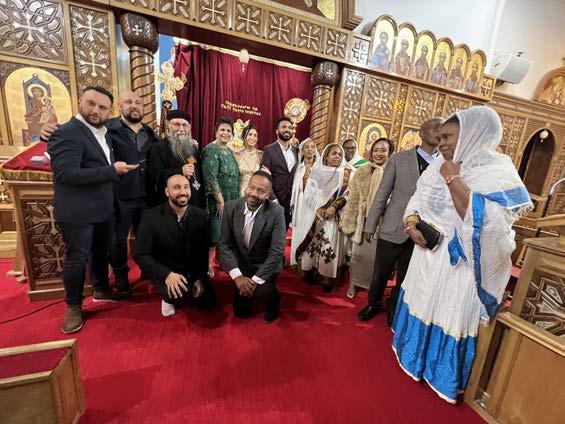
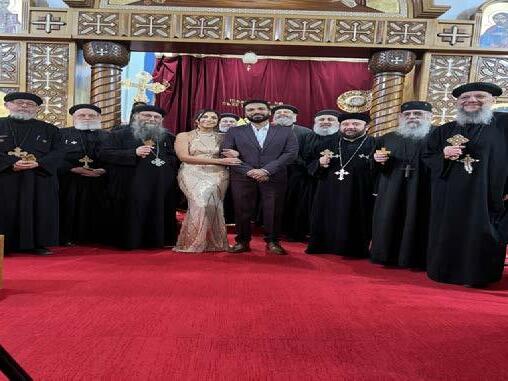
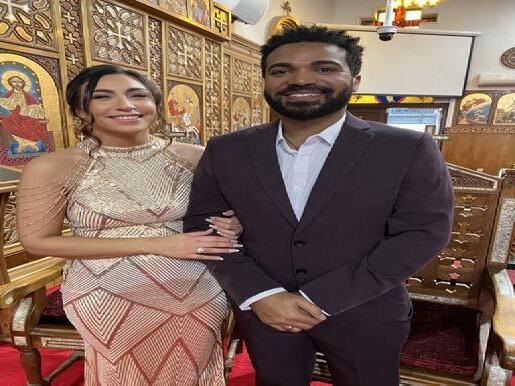
Levi Tefera & Marina Elis
)daughter of Fr Samuel and Tasony Mary(
Sunday 16th July 2023
St George’s Church

